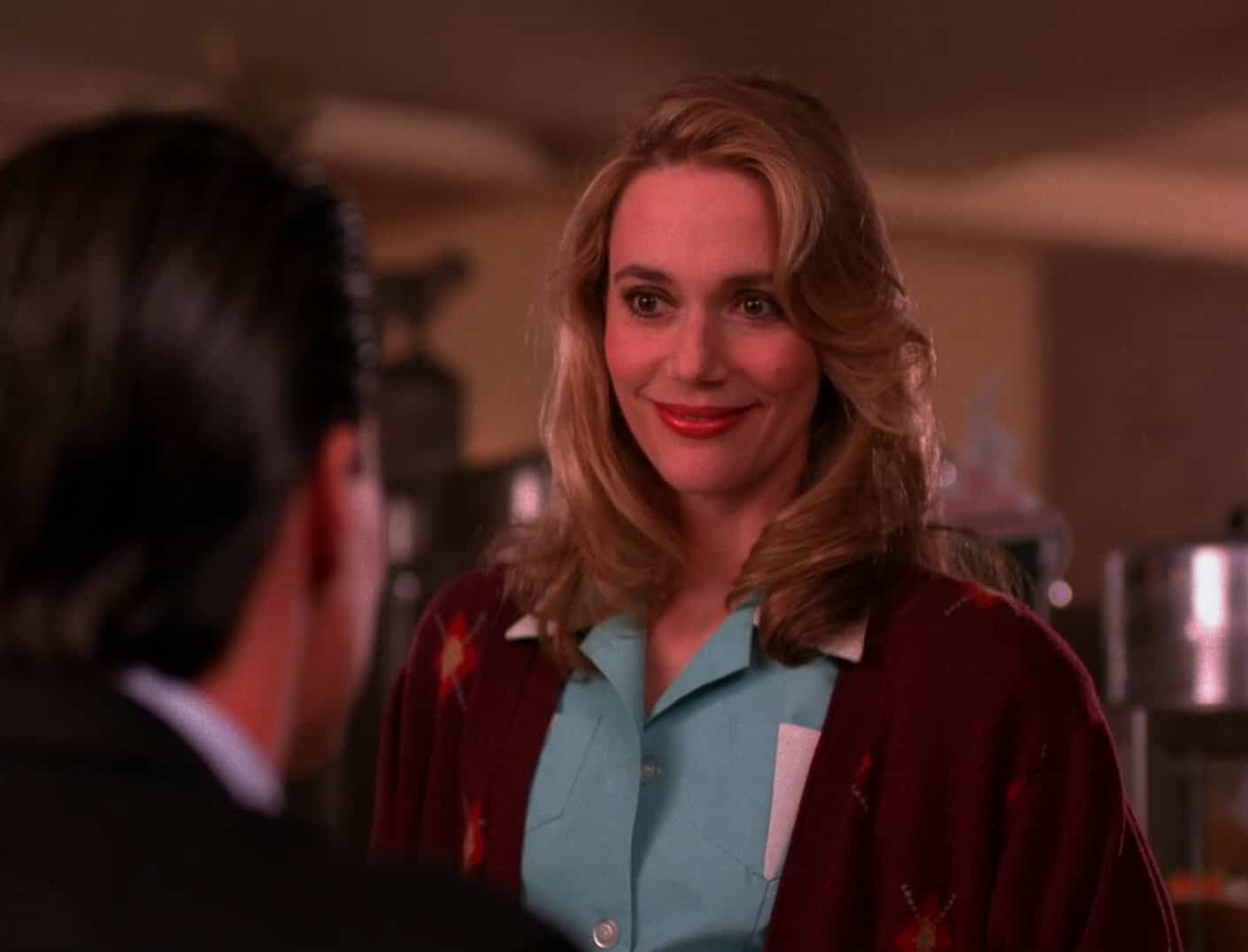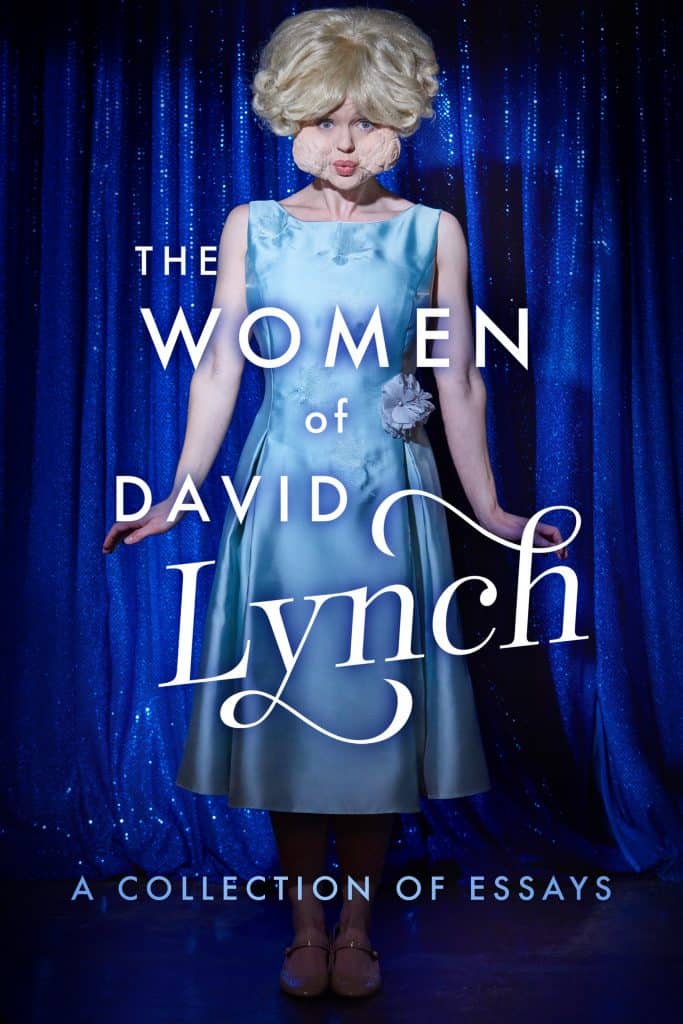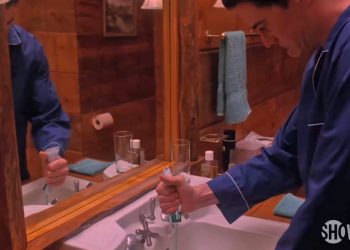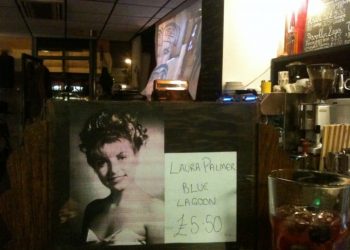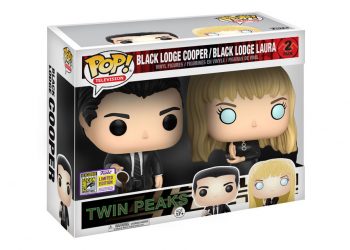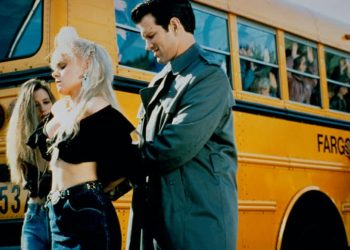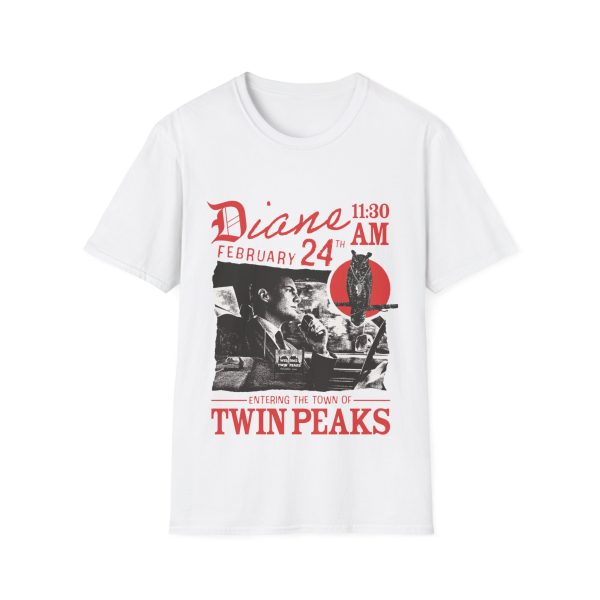The following essay by Mallory O’Meara was originally published as part of the recommended The Women of David Lynch by Fayetteville Mafia Press, out now as hardcopy and eBook (Amazon). O’Meara is a best-selling author, screenwriter and a film producer for Dark Dunes Productions. Find her @malloryomeara on Twitter, or go to malloryomeara.com to learn more about her work.
In honor of Peggy Lipton who passed away on May 11, 2019, Mallory O’Meary, Scott Ryan and David Bushman have granted Welcome to Twin Peaks the rights to republish the essay for all Twin Peaks fans to read in this time of grief. Images were added by Welcome to Twin Peaks.
Warding Off The Darkness With Coffee And Pie
Evil looms over the strange mountain town of Twin Peaks.
In David Lynch and Mark Frost’s groundbreaking television series, many of the citizens of this remote place find themselves struggling against malevolent forces. The killer Bob rides the hapless soul of Leland Palmer like a murderous jockey from hell. The criminal Renault brothers peddle drugs that soar up the noses of high school students. Leo Johnson beats and dominates his wife, Shelly. The unscrupulous Horne Corporation eats away at the heart of the town.
All of these agents of darkness have their foils, their counterparts in lightness. Agent Cooper grapples with both the corporeal and incorporeal forms of Bob. Sheriff Harry Truman—along with deputies, donuts, and enthusiastic secretary Lucy Moran—works to take down the corrupt Renault operation. Bobby Briggs, Shelly’s secret boyfriend, is determined to save her from Leo’s raging fists. The shadow cast by the Horne Corporation contrasts with the lightness and warmth of Norma Jennings’ Double R diner, a bulwark against the evil encroaching on Twin Peaks. In this small community, evil assaults on all fronts, including the economy. The Horne Corporation, run by slick Benjamin Horne and his hedonistic brother Jerry, owns most of the town. The pair want to suck Twin Peaks dry by buying up as many companies and as much property as they can, often employing nefarious means to get what they want. Seasons one and two find the brothers scheming over a project called Ghostwood, a plan to turn a vast swath of pristine forest surrounding the town into a country club.
During the course of the first season, Benjamin conspires to shut down the Packard Sawmill—the town’s main employer—so that he can purchase the land upon which it sits. Hundreds of locals depend on the mill for work. The Horne department store funnels teenage female employees to One Eyed Jacks, located just over the Canadian border, where they become sex workers. The Horne brothers own and profit off of this casino, a hotbed of drugs, underage prostitution, and other avenues of crime. Benjamin and Jerry embody corporate evil.
But while the Hornes devour Twin Peaks, Norma Jennings nourishes it.
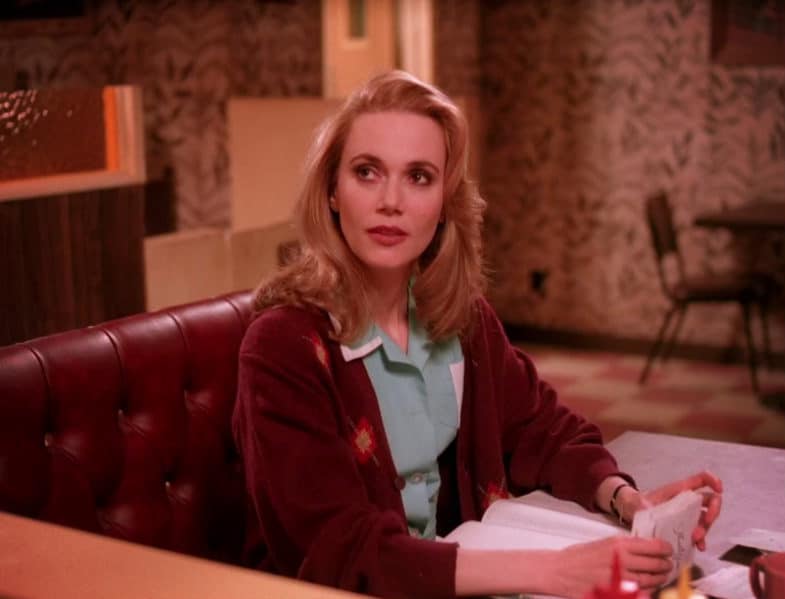
Norma is the sole proprietress of the Double R, an establishment beloved by the citizens of Twin Peaks. The Double R fills the stomachs of the town with excellent coffee and the finest pie around. Norma, as an independent small-business owner and longtime citizen, is a well-respected member of the community, and a pillar of the Twin Peaks economy.
Besides feeding those in need through Meals on Wheels, the Double R Diner serves as a haven for agents of justice. Many of Agent Cooper and Sheriff Truman’s missions begin with a stop at the diner for mugs of piping-hot coffee and a quick meal. Norma’s brew quite literally fuels the fight against evil. While the denizens of the Black Lodge meet above a convenience store, the forces of good meet at the Double R.
The diner itself acts as a safe space for many of the characters, no matter what or whom they’re battling. Norma’s business is a refuge of virtue and light. Shelly works as a waitress there, and the building is her sanctuary against her abusive husband. Maddy, Donna, and James frequently meet up at the Double R while seeking to uncover the identity of Laura Palmer’s killer. Here Norma can inconspicuously interact with her not-so-secret love, Big Ed Hurley. Agent Cooper falls in love with Norma’s sister (half-sister?), Annie, while she is working as a Double R waitress and serves him his beloved black coffee. Bobby Briggs and his father, Major Briggs—a main player in the battle against the forces of the Black Lodge—share their most important and loving moment in a diner booth over a partially eaten piece of huckleberry pie.
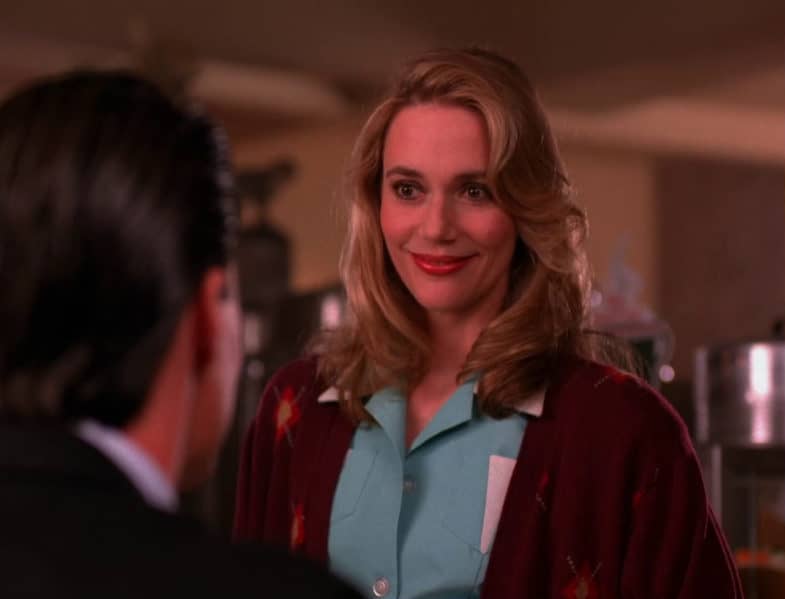
Even Audrey Horne finds comfort here. One of the most famous scenes in the entire run of the show features Audrey happily swaying on the linoleum diner floor to a dreamy song playing on the jukebox. She spends most of her time at her father’s hotel, The Great Northern, another important establishment in town. Most of Audrey’s scenes here are fraught with uncertainty and sadness, unless she is in the presence of the stalwart Agent Cooper. At the Double R, she can enjoy rare moments of being comfortable in her own skin. This scene is evoked in the third season of Twin Peaks, by which time Audrey has mentally degenerated and is trapped somewhere in her own mind. When that same song from the Double R jukebox plays, she dances and sways again. It’s her only moment of contentment in the entire third season.
The Great Northern, on the contrary, is a well of darkness. The Horne family stronghold is a frequent location for sadness, fear, and death. It is here that Josie—Sheriff Truman’s girlfriend and the owner of the Packard Sawmill—mysteriously dies, triggering an appearance by Bob (who, by the way, never shows his face in the Double R). Agent Cooper is shot in his room here and left bleeding for hours. Killer Bob cavorts through the halls in the body of poor Leland Palmer. In season three, it is revealed that one of the entrances to the Black Lodge exists in the bowels of the Great Northern boiler room.
The Horne family represents the dark side of the American Dream. Benjamin and Jerry Horne have immense wealth and business success. Benjamin’s nuclear family comprises his wife, Sylvia, and their two children, Audrey and Johnny. On paper, he has a perfect life. But in reality, he is one miserable son of a bitch. His marriage is a hot garbage pile; he and Sylvia despise each other. His relationship with Audrey is fractured, marred by neglect and resentment. When not scheming in his office at The Great Northern, Benjamin is cheating on his wife with the young women of One Eyed Jacks or cozying up to the criminal underbelly of Twin Peaks. During seasons one and two, he has an affair with well-to-do Twin Peaks businesswoman Catherine Martell. With her, Benjamin conspires to shut down the Packard Sawmill, simultaneously scheming with Josie to double-cross Catherine. Benjamin Horne is ten pounds of corruption stuffed in a five-pound bag.
Norma’s life, on the contrary, seems less than ideal from the outside. She’s in a bad marriage with lowlife Hank Jennings, who’s serving jail time for manslaughter early in the series. He also has a mullet, which is basically all you need to know about Hank. At the end of the second season, Norma begins the messy process of divorce after Hank lands himself in jail again, this time for the attempted murder of Leo Johnson. Norma has no children and is estranged from her family, except for Annie. In one heartbreaking episode, viewers get to meet her toxic mother. Like Benjamin, Norma is cheating on her spouse. She was meant to marry her high school sweetheart, Big Ed, but a big fight and a night of spiteful, drunken confusion led Big Ed to marry the deranged Nadine instead. Norma ended up with Hank. But while the core of Benjamin’s life is greed, the core of Norma’s is love.
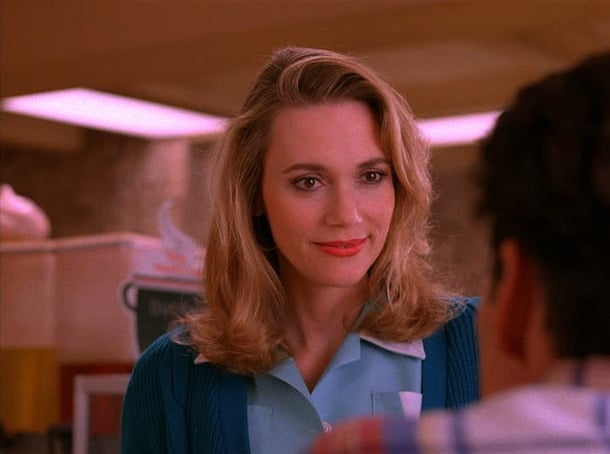
She is a beloved member of the Twin Peaks community. Her employees adore her, especially Annie, with whom Norma shares a close bond. Even though her relationship with Big Ed is constantly beset with obstacles, their love for each other is strong and true. In a very progressive move for 1990s television, Norma is uncomplaining about her childless life. It’s not clear if she is childless by choice, but it never becomes an issue. No character ever patronizingly asks Norma when or if she is going to have children, or insists that her life would be happier with them. No one ever mentions it. Norma gets love and support through close friendships, particularly with Shelly. In the third season, Shelly is still working at the Double R, as Norma’s right-hand woman and closest confidant. Although lacking a traditional family, Norma lives a life that’s rich and full, just like her coffee.
Benjamin and Jerry are never full. They’re depicted as ravenous villains, often actually cackling while devouring food. The original seasons of Twin Peaks feature scenes in which the brothers act like hungry hounds from hell. They practically leer at each other with dripping teeth—insatiable wolves, literally and metaphorically. The Horne brothers hover over the town, smacking their lips and rubbing their palms together in anticipation of more money made, more power gained.
Norma combats this hunger. The heavenly pie at her counter nourishes the bodies and hearts of Twin Peaks. When Leland and Sarah Palmer are deep in madness and grief over the loss of their daughter, Laura, their niece Maddy picks up food for them at the Double R. The anxious town recluse Harold Smith has his dinner delivered through Meals on Wheels. Even the Log Lady thinks the pie is a “miracle.”
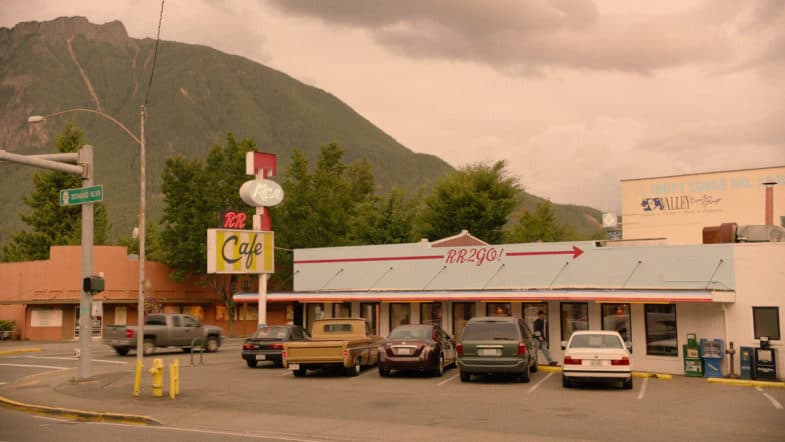
The bright lights of the Double R counter not just the shadow cast by the Horne Corporation, but also the mysterious evil of the Black Lodge. Things make sense inside the Double R, in stark contrast to the strange happenings in the woods around the town. The staples of the diner—coffee, pie, an old-timey jukebox—are likewise staples of the wholesome Americana that David Lynch often equates with safety, security, and happiness. While the denizens of the Black Lodge hold up bowls of garmonbozia, Norma holds a plate of comforting cherry pie.
As season three of Twin Peaks begins, Norma is attempting to manage the franchising of the Double R. She has been divorced from Hank for some time and has a slimy-businessman boyfriend helping her run these other diners. The franchise is becoming profitable, but at the cost of the quality of the food. The boyfriend tells her that by using lower-quality ingredients, she can make even more money. Norma refuses to compromise her principles by serving her customers inferior pies. She rejects the corporate business model because it conflicts with her values. She cares more that her community is well fed and satisfied.
The Benjamin Horne of season three is, like Norma, still ensconced in his work. But the Horne Corporation hasn’t brought him happiness. Also like Norma, he is divorced. He is alone and stuck in a bitter financial battle with his now ex-wife, who has custody of Johnny. Audrey isn’t speaking to him, and her son—Benjamin’s grandson—behaves heinously, constantly causing the family grief. Benjamin’s business ventures haven’t brought him the immense fortune he hoped for, either. The Horne Corporation is held afloat by Jerry’s extremely profitable marijuana business (thanks to Washington’s recent legalization law). Jerry has completely abandoned the greedy Horne philosophy in favor of a quieter, perpetually stoned existence.
When we return to the town, it is clear that the darkness long creeping over Twin Peaks has gained a lot of ground in twenty-five years. But the Double R is still a sanctuary, a beacon of light, even as the tide of violence laps at its door—sometimes literally, as in the scene where Bobby investigates an accidental shooting that occurs in the street outside.
Norma’s final scene shows her once again standing up to the forces of greed. After agreeing to let the businessman boyfriend buy out her shares of the company and take over the other diners, Norma gets to preserve her original establishment and keep those shameful business practices out of her corner of Twin Peaks. She does this literally, by casting the slimeball boyfriend out of the Double R. Moments later, Norma steps up to a newly single Big Ed. He proposes to her and the audience gets to experience one of the few bright moments of the entire third season. It is also one of the few moments of narrative completion in the show. The ending of Twin Peaks is full of loose ends and ambiguity. The culmination of their storyline is a rare instance of resolution and, even rarer, a happy ending.
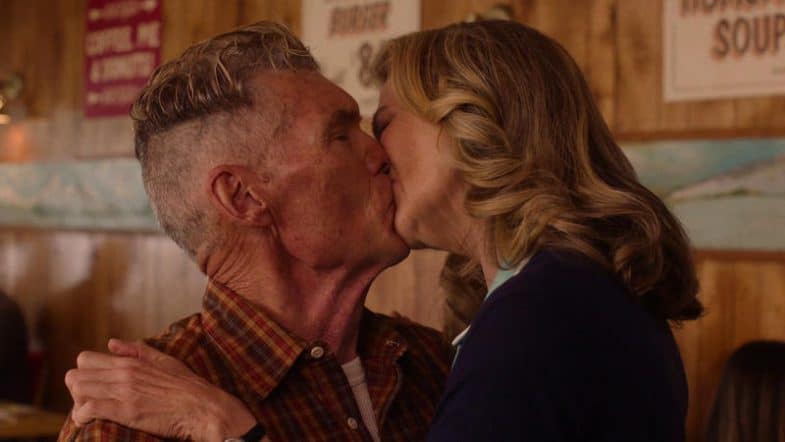
In all three seasons of the show, Norma stands guard over the heart of Twin Peaks. Sticking to her guns as a small-business owner, she eschews the path of the Horne brothers and places the satisfaction and nourishment of the town over her own profit. Along with Agent Cooper and the Bookhouse Boys, Norma is an instrumental force of good.
Norma Jennings is a beacon of love and integrity in the tenebrous mists of Twin Peaks. She stands at the counter, warding off the darkness with coffee and pie.
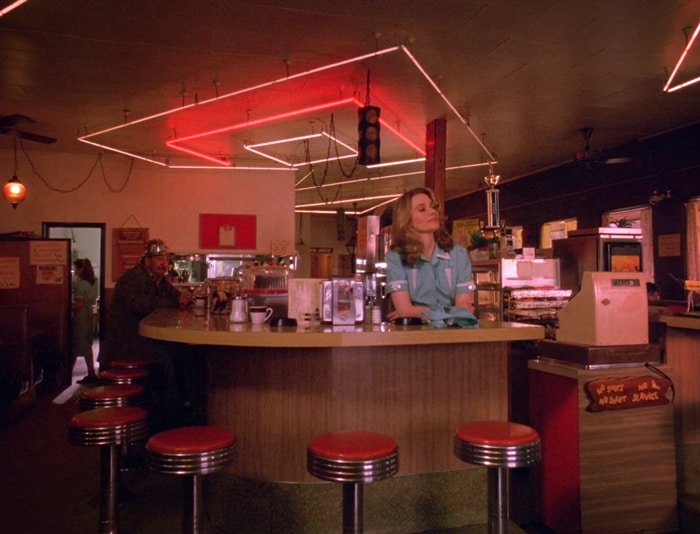
As published in:
The Women of David Lynch: A Collection of Essays
David Lynch has been accused for decades of sexism and even misogyny in his work, due largely to frequent depictions of violence against women. Yet others see in Lynch’s work the deification of the female, and actresses like Laura Dern and Naomi Watts jump at every opportunity to work with him. “He is the master of the juxtaposition of the creepy and the sweet, the sexual and the chaste,” wrote W’s Lynn Hirschberg. “And at the heart of this tense, intriguing friction, you will always find Lynch’s women.” The Women of Lynch is a deep, provocative dive into this paradox, featuring twelve essays, thought pieces, and impressionistic interpretations of Lynch’s depiction of women on screen by an eclectic array of accomplished female critics, scholars, performers, and writers, each tackling this vexing conundrum in her own unique way. It also contains brand new interviews with Lynch actresses Mädchen Amick (Shelly Johnson, Twin Peaks) and Charlotte Stewart (Eraserhead, Twin Peaks)

